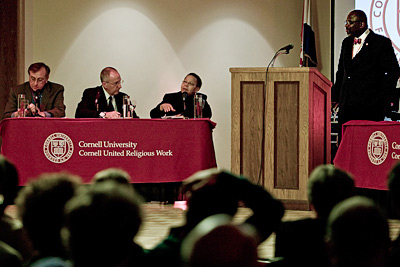CURW panelists: Religion's role on campus to foster values, explore 'depths of universal life experience'
By John Mikytuck

"How do we prepare students academically and spiritually to live good lives and to deal with the realities of suffering, aging and death that are all a part of living?" was one of many challenging questions raised at a panel discussion, "Religion and Public Life," sponsored by Cornell United Religious Work (CURW) in celebration of its 80th anniversary, May 11 at the Cathedral NYC.
Cornell President David Skorton and Provost W. Kent Fuchs participated in the multifaith discussion, which explored social justice, religious pluralism, secular humanism and science on college campuses. Rev. Kenneth I. Clarke Sr., director of CURW, moderated six panelists including Jewish, Muslim, Tibetan/Buddhist/Christian and humanist chaplains from various universities.
In her opening comments, Susan Murphy, Cornell vice president for student and academic services, told 200 guests that A.D. White helped found Cornell in the 1800s as a nonsectarian university, unlike other institutions of higher learning at the time.
"White was committed to Cornell not being dominated by any one faith," said Murphy, "perhaps, because White had been expelled from the Religious Society of Friends and married a non-Quaker." Ezra Cornell, however, while defending White's position, also understood that "religion was an absolute and pressing need." Both men agreed that the university's campus and students needed to be free from sectarianism.
Clarke challenged the panelists to discuss what some call "intellectual/political apartheid," a belief that matters of the spirit belong to religion, but that such public challenges as poverty should be solved by secular reasoning. Clarke asked how universities can reach out to religious and nonreligious community members and include them in conversations, coalitions and activities.
"One of the central roles of the university is to strengthen the values students need in order to lead valuable lives," said Skorton. As part of the Cornell's strategic plan, students will be required to display "multicultural competency, moral/ethical compass, self-management and community engagement," he said.
Panelist Rabbi Alan Flam said, "Most universities don't focus on spirituality since U.S. News doesn't include it in their rankings of best colleges." However, "it is worthy of support because all traditions have at their core teachings that reach into the depths of universal life experience," said Flam, senior fellow at the Swearer Center for Public Service at Brown University and executive director of the Brown-RISD Hillel Foundation. If education is a transformative process, "individual religions and their collective knowledge ought to be on campuses."
"Today, one out of every four or five adults ages 18-25 define themselves as non-religious," said Greg Epstein, humanist chaplain at Harvard. Humanists believe, he said, that there is one world, the natural world, and that science is the best tool to determine the nature of it. "We need to have a better conversation," said Epstein, "a dialogue rather than a circular firing squad."
One source for that dialogue has been CURW, said Clarke. "In 1929, CURW was the first example of Protestants, Catholics, Christians and Jews coming together in one organization to work together for a common goal," he said. Today, 80 years later, CURW comprises 30 affiliated communities and offers programs of worship, study and social life, as well as opportunities for students to engage in interfaith dialogue. CURW is housed in Anabel Taylor Hall, a gift of Cornellian Myron Taylor, who believed that "religion is the greatest force in the world today."
Other panelists included Jan Willis '69, professor of religion at Wesleyan University and a Buddhism teacher for 37 years, and Ingrid Mattson , professor of Islamic studies and director of the Islamic Chaplaincy Program at the Hartford Seminary.
John Mikytuck '90 is a freelance writer in New York City.
Get Cornell news delivered right to your inbox.
Subscribe